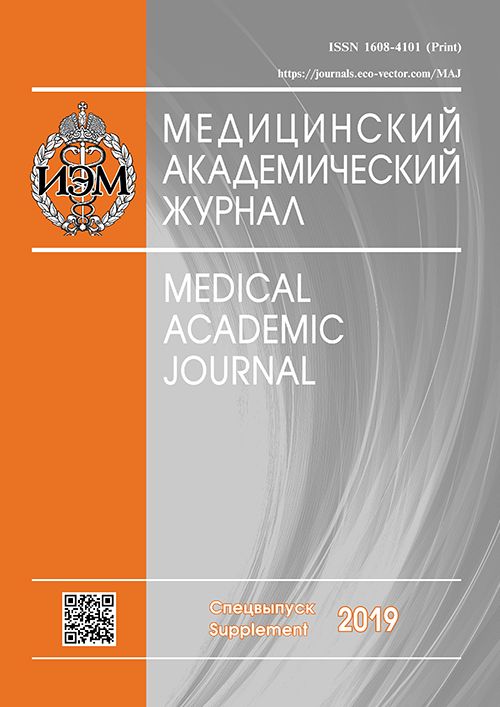TURMERIC EXTRACT IN CORRECTION OF NERVOUS AND IMMUNE SYSTEMS FUNCTIONAL ACTIVITY PARAMETERS IN EXPERIMENTAL ALCOHOLISM
- Authors: Markova EV1,2, Goldina IA1, Goldin BG2,3, Knyazheva MA1, Savkin IV1
-
Affiliations:
- Laboratory of Neuroimmunology, Federal State Budgetary Scientific Research Institute of the Fundamental and Clinical Immunology, Novosibirsk
- Novosibirsk State Pedagogical University, Novosibirsk
- Federal State Budgetary Educational Institution of Higher Education “Novosibirsk State Medical University”, Novosibirsk
- Issue: Vol 19, No 1S (2019)
- Pages: 215-217
- Section: Articles
- Published: 15.12.2019
- URL: https://journals.eco-vector.com/MAJ/article/view/19404
- ID: 19404
Cite item
Abstract
The purpose of this work was to study the effect of turmeric extract on behavior indicators, the severity of the cellular immune response in animals in a state of experimental alcoholism. Experimental models: mouse males (CBAxC57Bl/6)F1 three months of age (n = 60). Alcohol dependence in experimental animals was formed by the method of 6-month soldering with a 10% ethanol solution. In the control groups, the animals received per os water or 10% ethanol solution, in the experimental group - an extract of turmeric powder in a solution of ethanol. Mice behavior was assessed in the “open field” test. The severity of the cellular immune response to sheep erythrocytes was assessed by the intensity of the development of a delayed-type hypersensitivity reaction.It was found that the use of turmeric extract against the background of taking ethanol solution in animals with experimental alcoholism leads to the stimulation of behavior and the increase of the cellular immune response to the level characteristic of healthy animals of the corresponding age.Results indicates the protective effect of turmeric on a number of parameters of the functional activity of the nervous and immune systems during chronic ethanol intoxication.
Full Text
About the authors
E V Markova
Laboratory of Neuroimmunology, Federal State Budgetary Scientific Research Institute of the Fundamental and Clinical Immunology, Novosibirsk; Novosibirsk State Pedagogical University, Novosibirsk
I A Goldina
Laboratory of Neuroimmunology, Federal State Budgetary Scientific Research Institute of the Fundamental and Clinical Immunology, Novosibirsk
B G Goldin
Novosibirsk State Pedagogical University, Novosibirsk; Federal State Budgetary Educational Institution of Higher Education “Novosibirsk State Medical University”, Novosibirsk
M A Knyazheva
Laboratory of Neuroimmunology, Federal State Budgetary Scientific Research Institute of the Fundamental and Clinical Immunology, Novosibirsk
I V Savkin
Laboratory of Neuroimmunology, Federal State Budgetary Scientific Research Institute of the Fundamental and Clinical Immunology, Novosibirsk
References
- Balanzá-Martínez V, Crespo-Facorro B, González-Pinto A, Vieta E. Bipolar disorder comorbid with alcohol use disorder: focus on neurocognitive correlates. Front Physiol. 2015;6:108.
- Aggarwal BB, Yuan W, Li S, Gupta SC. Curcumin-free turmeric exhibits anti-inflammatory and anticancer activities: Identification of novel components of turmeric. Mol. Nutr. Food Res. 2013;57:1529-1542.
- Goldina IA, Goldin BG, Gaidul KV. Clinical efficacy of turmeric in diseases of the nervous system. Neuroimmunology. 2015;XVII(2):265. (In Russ.)
- Goldina IA, Gaidul KV. Biological activity and therapeutic properties of Curcuma Longa L. (Literature review). Vestnik NSU. 2015;13(1):141-149. (In Russ.)
- Goldina IA, Markova EV, Goldin BG, et al. The protective properties of turmeric in ethanol-induced behavioral disorders. Saratov Journal of Medical Scientific Research. 2017;13(1):131-135. (In Russ.)
- Markova E, Knyazheva M, Savkin I, Shushpanova T. Effect of original anticonvulsant meta-chloro-benzhydryl-urea on behavioral and immune parameters in mice with active and passive behavior types in experimental alcoholism. European Psychiatry. 2017;41(S):S742-S743. (In Russ.)
- Markova EV, Obukhova LA, Kolosova NG. Parameters of cell immune response in Wistar and OXYS rats and their behavior in the open field test. Bulletin of Experimental Biology and Medicine. 2003;136(6):588-590.
Supplementary files







